There's no place for fixed-odds betting terminals on Britain's high streets
Given their capacity to make their addicted users, and in turn the users’ families, even poorer, more distressed and ill, there must have been some cynical motivations behind their continued presence for so long

Your support helps us to tell the story
From reproductive rights to climate change to Big Tech, The Independent is on the ground when the story is developing. Whether it's investigating the financials of Elon Musk's pro-Trump PAC or producing our latest documentary, 'The A Word', which shines a light on the American women fighting for reproductive rights, we know how important it is to parse out the facts from the messaging.
At such a critical moment in US history, we need reporters on the ground. Your donation allows us to keep sending journalists to speak to both sides of the story.
The Independent is trusted by Americans across the entire political spectrum. And unlike many other quality news outlets, we choose not to lock Americans out of our reporting and analysis with paywalls. We believe quality journalism should be available to everyone, paid for by those who can afford it.
Your support makes all the difference.There is no social evil more obvious and easier to stop than the prosaically named fixed-odds betting terminal (FOBT). For whatever psychological reason, the FOBTs have proved themselves an especially addictive form of gambling, commonly termed the equivalent of crack cocaine – and just as ruinously expensive a habit as any Class A drug.
At £100 every 20 seconds, the current maximum stake level, the capacity for the destruction of personal wealth, right down the last few pounds for food or children’s clothes, has become obvious; the consequent enrichment of the big betting firms, with a cut to HM Treasury, is merely the obverse of this particular coin. FOBTs are licensed parasitism.
As is well documented, FOBTs in betting shops have caused much human misery. The greatest scandal attached to their proliferation, in fact, is that it has taken government so long even to get to the point of contemplating reform. There is now the prospect, at last, of the £100 maximum stake being lowered, with a limit of £2 actively considered. The latest consultation will take 12 weeks to consult about the reality of FOBTs, which has been plain for a very long time – namely that the country is better off without them.
Given their capacity to make their addicted users, and in turn the users’ families, even poorer, more distressed and ill, there must have been some cynical motivations behind their continued presence for so long. Unfortunately, these are not difficult to discern. For betting companies based on high streets and under intense competitive pressure from online gambling outfits, the FOBTs presented a uniquely profitable proposition. On some estimates the machines contributed about half of some companies’ operating profits. With dependent users easily losing hundreds of pounds an hour, and there being little in the way of overheads, the FOBT is the closest thing to a licence to print money possessed by any institution outside the Bank of England.
The Association of British Bookmakers plead that they are superior to online gambling because they are “supervised” and users can voluntarily opt to have themselves excluded or have their stakes limited by betting office staff “when the fun stops”, in the industry’s phrase. Well, that depends on the awareness of the staff and the ability of gamblers to discipline themselves; neither should be assumed.
There are far too many cases where either or both of these conditions have been found badly wanting. It may be true that online gambling can be equally addictive and ruinous; but that is a reason to try to regulate that activity rather better. Much of it is offshore, but with the help of the EU’s authorities such havens as Gibraltar can be encouraged to take a more responsible approach to their money-making sidelines.
It is also argued that these machines create jobs and generate tax revenues, providing work in otherwise shuttered high streets. Well, it would be perfectly possible to liven up every shopping centre with some legalised crack dens, and the occasional public hanging, and, duly taxed, they would also surely have the potential to generate £450m a year in returns to HMRC. Besides, the cost to the economy of gambling addiction must be substantial: lost output from those who can no longer hold down a job; the costs of policing and the criminal justice system when they turn to crime; social housing when they’ve finally gambled the last of the rent money away; plus any NHS treatment they require to beat the addiction.
All of those must surely outweigh even half-a-billion in tax take; even if they did not, the cost of the human misery the FOBTs cause is simply incalculable. There are better ways to regenerate town centres. We have tolerated these machines for no good reason for far too long already.
Join our commenting forum
Join thought-provoking conversations, follow other Independent readers and see their replies
Comments